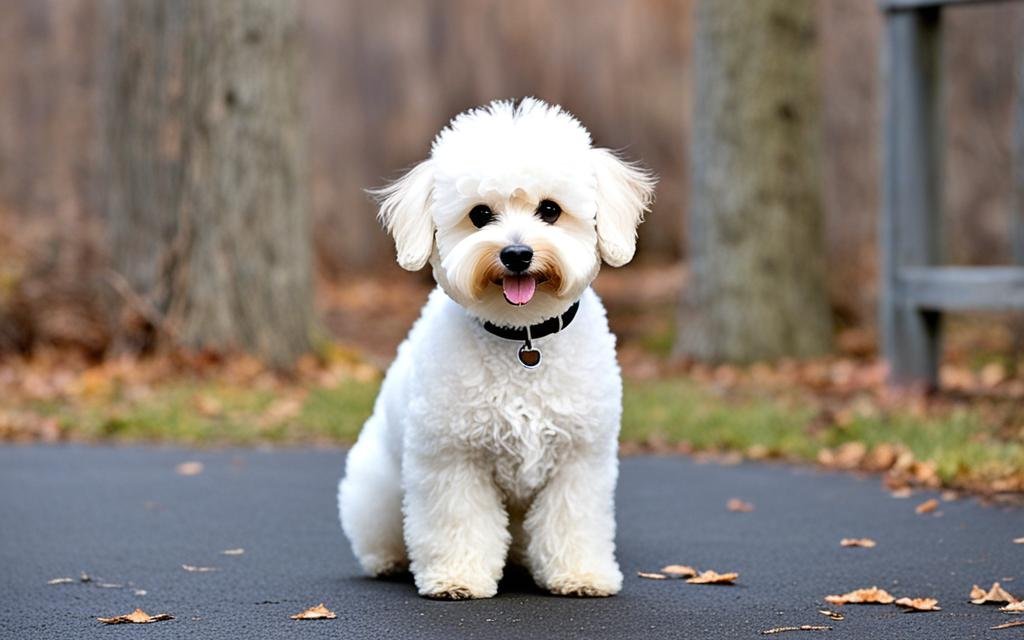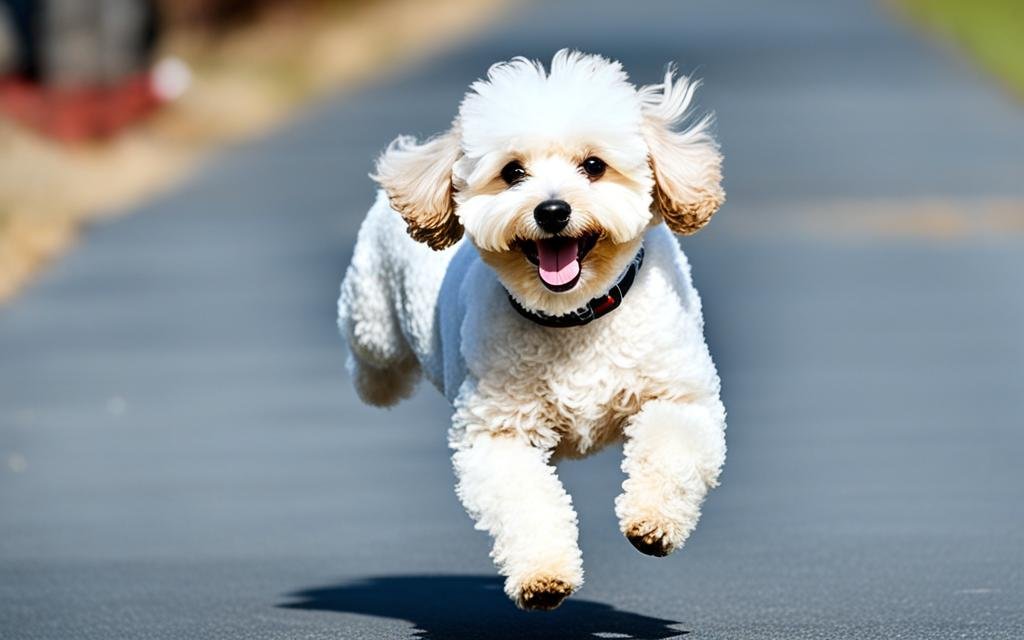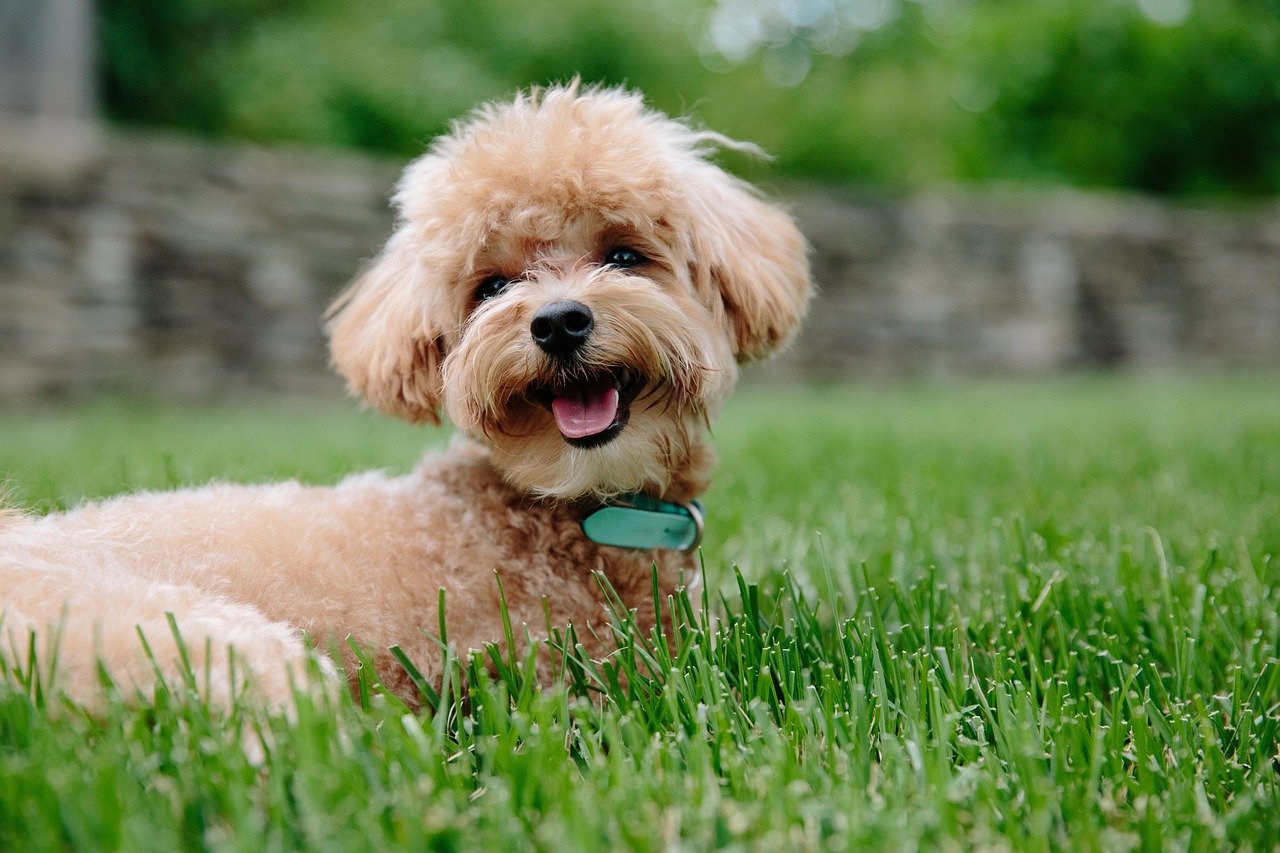Ever wondered why the Bichon Frise Poodle is so loved? This designer dog breed, known as the bichon poodle mix, bichpoo, or poochon, combines the Bichon Frise and Poodle. It shows off the best qualities of both.
In Australia, this mix started in the late 1990s. It quickly became popular for its smarts, low-shedding fur, and sweet nature. Even though big kennel clubs don’t officially recognize it, the bichon poodlebichon poodle mix is a hit with mixed-breed groups and dog fans. It’s a great choice for families.
Table of contents
Key Takeaways
- The Bichon–Frise–Poodle mix is a beloved designer dog breed known for its cute looks and sweet personality.
- It mixes the Poodle’s smarts and hypoallergenic coat with the Bichon Frise’s playful and friendly nature.
- These dogs usually live 12 to 15 years and need regular grooming to keep their curly coat nice.
- They can have health issues, so they need a good diet and regular vet visits.
- Great for first-time owners, the bichon poodle mix is smart and easy to train, perfect for any family.
Introduction to the Bichon Frise Poodle Mix
These dogs weigh 6 to 20 pounds and are about 9 to 15 inches tall. They have an agile, compact body. Family dogs that fit well in apartments, they get along with kids and other pets. They’re perfect for both new and experienced dog owners.
Their coat is medium-length and curly, in colors like black, brown, white, apricot, tan, and cream. Keeping their coat soft and preventing mats requires daily brushing and grooming every 2 to 3 months.
These dogs live 12 to 15 years and are generally healthy. But, they might have patellar luxation, allergies, eye problems, and dental issues. Regular vet visits and high-quality dog food can help prevent these health problems.
They need 30 to 60 minutes of exercise daily to stay fit and happy. Training is easy because they’re smart and friendly. Early socialization helps prevent barking and separation anxiety.
Getting a bichon frise cross poodle mix from a rescue or a good breeder means adding joy and loyalty to your home. With the right care, love, and training, they become beloved family members for many years.
Bichon Frise Poodle: Physical Characteristics and Appearance

The bichon poodle is known for its cute and sweet looks. It comes from the toy poodle and the miniature poodle. This mix has unique and wanted traits.
Size and Weight of bichon poodle
This mix fits well in many homes. It stands 9 to 15 inches tall and weighs 6 to 17 pounds. Those with a toy poodle parent are usually smaller. Those with a miniature poodle parent are a bit bigger.
Coat and Colors
The bichon poodle has a curly coat that’s both long and soft. It looks like the bichon frise and poodle coats, making it good for people with allergies. It comes in apricot, cream, white, and red colors. Sometimes, it can be black or gray, making it even more interesting.
General Appearance
Bichon poodles look like cute teddy bears. They have a soft, fluffy tail, a small button nose, and round eyes that can be dark amber or brown. Their coats can be one color or mix of colors, making them look even better. They keep acting like puppies their whole lives, which many people love.
Bichon Poodle Temperament

The bichon poodle mix is known for its sweet and loving nature. It’s a favorite among those looking for playful pets and companions. This breed is gentle and friendly, making it a joy to be around.
Friendly and Playful
Bichon poodles love making new friends and are always up for fun. They’re perfect for families with kids. These pets quickly become the best friends of children, enjoying games and activities together.
They even love joining in on dog sports like agility courses. This shows their lively and spirited nature.
Affectionate and Gentle
This breed loves getting hugs and physical affection. They’re a loving addition to any home. Bichon poodles are kind to everyone in the family, including the kids. They’re loyal and attached to their owners, always looking for cuddles and bonding time.
Intelligent and Trainable
Bichon poodles are smart because of their bichon and poodle roots. They’re eager to learn and please, making them easy to train. This makes them great for dog sports and agility training.
Using consistent training methods and positive reinforcement helps them learn even better. Training becomes fun and effective for both them and their owners.
Grooming and Care for Bichon Poodle
Bichon poodles are a mix of toy or miniature poodles and bichon frises. They need thorough grooming to keep their curly, plush coats looking great. It’s important to follow a routine that includes coat care, regular baths, and health checks.
Coat Maintenance
Brushing your bichon poodle every day helps prevent mats and knots. Their coats don’t shed much, so they need careful attention. Getting a professional groom every few months keeps their coat in top shape.
Brushing them two to three times a week stops mats and keeps their coat healthy.
Bathing and Hygiene of bichon poodle
Bathing your bichon poodle regularly is key to their cleanliness. It helps prevent skin problems. Keeping their ears clean and trimming their nails is also important for their health.
Regular grooming includes ear cleaning, nail trimming, and coat trimming. This keeps them clean and healthy overall.
Health Considerations
Bichon poodles are usually healthy but can face issues like patellar luxation and retinal atrophy. Knowing about these problems helps you take care of them. Regular vet visits can catch health issues early.
Feeding them fatty acids or supplements can also help their coat and grooming routine.
Lifestyle and Exercise Needs
The Bichon Poodle mix is a high-energy breed that needs daily activity. A structured exercise regimen is key to their health. They fit well in apartment living suitability if their exercise needs are met.
Bichon Frise dogs need 30 minutes to 1 hour of exercise every day. Puppies need five minutes of activity for each month they are old. This means their exercise needs grow as they get older, keeping them healthy and balanced.
Games like Hide & Seek and Fetch are great for their body and mind. Tools like the PitPat Dog GPS Tracker track their activities. This helps make sure they get enough exercise.
Even though they can live in apartments, they need varied exercises to prevent boredom. Outdoor activities and indoor games keep them happy and healthy.
As Bichon Frise dogs get older, they might need less exercise. It’s important to adjust their activities. This keeps them healthy and active at all life stages, improving their quality of life.
Looking after their exercise needs and keeping them mentally stimulated is crucial. It helps keep their physical and mental health in top shape.
Conclusion
The Bichon Frise Poodle mix, or Bichpoo, is a great pet for many homes. It’s small, friendly, and easy to train. It weighs 10 to 20 pounds and is about 9.5 to 11.5 inches tall. This mix combines the best of both breeds, making it a wonderful companion.
This designer dog has a hypoallergenic coat, which means it sheds less. This makes it perfect for people with allergies. Bichpoos can live from 12 to 15 years, sometimes longer with proper care. They need regular grooming but are worth the effort.
Bichpoos are smart, thanks to the Poodle side, so they’re easy to train and fit well in any home. They love to play and be close to their owners. They also need daily exercise and fun activities to keep them happy.
In short, the Bichon Frise Poodle mix is ideal for families wanting a smart, loyal, and loving pet. This mix of traits makes the Bichpoo more than just a pet. It’s a lasting friend that brings joy and quality to life.
See More : How Much Does Pet Cremation Cost in USA
FAQ
Q: What is a Bichon Frise Poodle mix?
A: The Bichon Frise Poodle mix, also known as a bichpoo or poochon, is a mix of the Bichon Frise and the Poodle. It combines the Bichon Frise’s playful and friendly nature with the Poodle’s smarts and low-shed coat.
Q: What are the typical physical characteristics of a Bichon Poodle?
A: Bichon Poodles are between 9 to 15 inches tall and weigh 6 to 17 pounds. They have a curly coat in colors like apricot, cream, white, red, black, or gray. They have a soft, fluffy tail, a button nose, and oval-shaped eyes.
Q: What is the temperament of a Bichon Poodle?
A: Bichon Poodles are friendly and playful. They love being around people and are great with families and kids. They’re smart and easy to train, perfect for dog sports and agility.
Q: How often should a Bichon Poodle be groomed?
A: They need regular grooming to keep their curly coats nice. Brush them daily to avoid tangles and mats. They should also see a pro every few months for grooming. Don’t forget about regular baths and taking care of their eyes and teeth.
Q: What are the exercise needs of a Bichon Poodle?
A: Bichon Poodles need lots of exercise to be happy and healthy. Aim for at least an hour of activity each day, including walks and playtime. They can live in apartments but need varied activities to keep them busy.
Q: Are Bichon Poodles hypoallergenic?
A: Bichon Poodles are often seen as hypoallergenic because they don’t shed much. But remember, no dog is completely hypoallergenic. People can still react differently to dogs.
Q: What health issues are common in Bichon Poodles?
A: Bichon Poodles are usually healthy but can face issues like patellar luxation, progressive retinal atrophy, cataracts, Addison’s disease, and Cushing’s disease. Regular vet visits and good health care are key to their health.
Q: How long do Bichon Poodles typically live?
A: Bichon Poodles can live between 10 to 18 years. They make great long-term pets for families.
Q: Are Bichon Poodles good with children and other pets?
A: Yes, Bichon Poodles get along well with kids and other pets. They’re gentle and friendly, making them great family pets. Early socialization helps them be less fearful or aggressive.
Q: Are Bichon Poodles recognized by major kennel clubs?
A: Bichon Poodles aren’t recognized by big kennel clubs like the American Kennel Club (AKC) because they’re mixed breeds. But, they’re loved by many for being great pets.

[…] cats face numerous dangers, including traffic accidents, predators like dogs and coyotes, and diseases such as feline leukemia virus (FeLV) and feline immunodeficiency virus […]